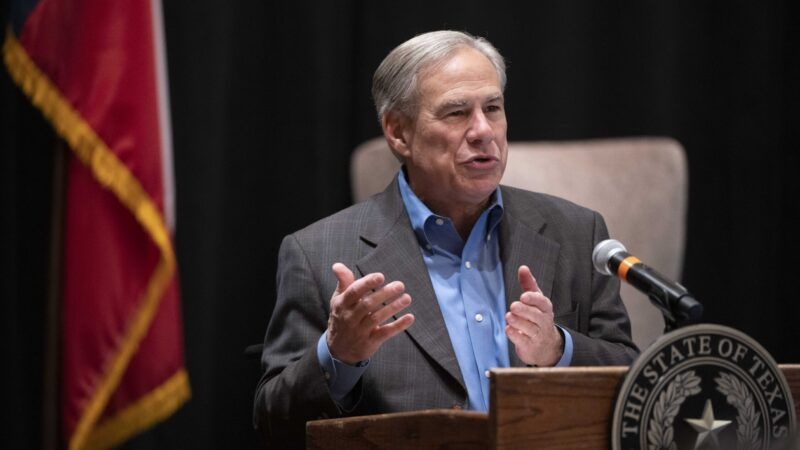Greg Abbott Spent $1,400 a Head To Bus Migrants to D.C. for a Political Stunt
Texas taxpayers might be stuck footing the hefty bill for Abbott's busing scheme.

In early April, Texas Gov. Greg Abbott unveiled a controversial plan to send buses full of undocumented immigrants to Washington, D.C. The policy, Abbott said, would "help local officials whose communities are being overwhelmed by hordes of illegal immigrants."
But it turns out those communities might be stuck footing the hefty bill for Abbott's busing scheme. According to state records obtained by Dallas–Fort Worth's NBC 5, bussing costs came out to over $1.6 million in April and May. With 1,154 migrants transported during that period, the per-rider cost was roughly $1,400.
That's far more expensive than a commercial bus or train ticket would've cost—a one-way journey from El Paso, Texas, to Washington, D.C., runs somewhere between $200 and $300 as of this article's writing. It's also more expensive than a first-class plane ticket from a border town to Washington, which NBC 5 reported ranged between $800 and $900. And it's more than the public spends on average to transport a student to school for an entire school year.
NBC 5 notes that costs are so high in part because the state has hired security guards to staff each bus. "Security-related expenses alone topped $1 million in the early weeks of the program, according to [Texas Division of Emergency Management] records," it explains. Costs are further inflated by the fact that buses drive back to Texas from Washington empty, having dropped off their passengers. Texas, however, gets billed for all total mileage.
The governor's office launched an online donation page to help fund the project after being "overwhelmed with phone calls, with letters, with requests" offering help. It also did so after mounting criticism that the effort would be funded by Texas taxpayers. But private donations have been minimal, totaling just $112,842 as of May 27. That discrepancy suggests taxpayers may end up on the hook for much of the busing bill.
The initiative's outcomes likely haven't been what Abbott desired, either. The political ripples in Washington have been minimal. And migrants themselves ended up better off, transported from the relatively remote border communities in Texas to D.C., where volunteers and immigrant advocacy organizations were ready to help. Organizers gathered at Washington's Union Station to welcome migrants, feed them, and connect them with housing and medical care. From The New York Times:
"In a way, it's actually perfect," said Bilal Askaryar, a spokesman for Welcome With Dignity, a collective of about 100 local and national groups that helps migrants. "Unintentionally, Governor Abbott sent them to one of the best places in the nation to welcome people."…
Santo Linarte López, a migrant from Nicaragua, had only $45 left from the $1,500 he had raised for his monthlong trip to the U.S. border. He said he did not understand why Mr. Abbott was paying for him to travel north, but he was grateful.
Abbott's busing plan is by no mean his only expensive anti-immigrant endeavor. He vowed last year to build a wall along his state's border with Mexico, initially transferring $250 million in state revenues to the project as a "down payment." A donation page for the wall has collected $55,322,273 as of May 27—unlikely to make a significant dent, given that a section of former President Donald Trump's border wall in Texas came out to $27 million a mile. Abbott's border-securing mission, Operation Lone Star, costs taxpayers over $2.5 million per week. That effort also left hundreds of migrants in pretrial detention for weeks or months over misdemeanor trespassing charges, as Reason's Scott Shackford has reported.
Abbott has long used migrants as political pawns, and it looks as though taxpayers, too, will continue to be burdened with the costs of his immigration enforcement plans.


Show Comments (154)